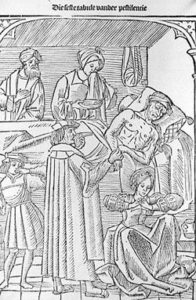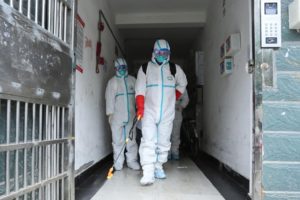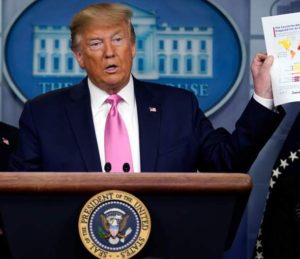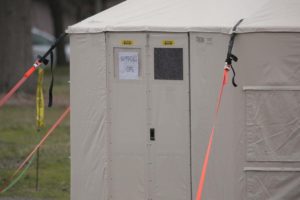Podcast: Play in new window | Download
COVID-19 Virus And History of Quarantine
“Quarantine” is a state, period, or place of isolation in which people or animals that have arrived from elsewhere or who have been exposed to infectious or contagious disease are placed.
As Law & Disorder taped this show in early March 2020, thousands of people around the globe are being quarantined as governments rush to keep the COVID-19 virus from spreading. In China, for example, thousands were forced into mass quarantine centers. And entire cities and towns in Italy were put on lock-down, sending an estimated 100,000 persons into quarantine.
In the United States, quarantines are being readied for some first responders. Two dozen emergency workers are being monitored for possible exposure to the coronavirus. And 27 firefighters and two police officers were quarantined in Washington State.
Today on Law and Disorder we’ll examine the civil liberties aspects of quarantines and other government responses to pandemics.
The word quarantine, and the practice, dates back to the Middle Ages. It was first used in English in 1617 to refer to the 40 days a ship suspected of carrying a contagious disease was detained offshore in isolation.
But the first instance of the institutionalized practice of quarantine actually occurred in the 14th century when the Bubonic plague, also referred to as Black Death, devastated Europe from 1347 to 1352, killing approximately 20 million people.
Authorities in Venice were the first to formalize the protective action after the plague began spreading there in 1347. Ports were closed to ships and travelers who had to spend 40 days in isolation.
In the early days of the United States local and state jurisdictions were responsible for protection against contagious diseases. After a 1793 yellow fever epidemic struck Philadelphia and killed 5,000, the city created a 10-acre quarantine station called the Lazaretto along the Delaware River.
With outbreaks of yellow fever, Congress passed the National Quarantine Act in 1878 marking the federal governments involvement with quarantine activities. The quarantine system was fully nationalized by 1921, according to the CDC.
- Open Letter From Public Health And Legal Experts
- Immigration Policies Weaken Ability To Fight Coronavirus
- Why CDCs Power To Quarantine Should Worry Us
Guest – Professor Wendy Parmet from Northeastern Law School is a leading expert on health, disability and public health law and directs the law school’s Center for Health Policy and Law and its JD/MPH programs. She holds a joint appointment with Northeastern’s School of Public Policy and Urban Affairs in recognition of her national leadership in interdisciplinary thinking and problem solving on health care issues. Wendy co-edits the law school’s SSRN online publications, Human Rights and the Global Economy and the Northeastern University School of Law Public Law and Legal Theory Paper Series. In 2016, Wendy was honored with the prestigious Jay Healey Health Law Teachers Award by the American Society of Law, Medicine & Ethics.
—-
COVID-19: Public Health Experts Urge US Government To Ensure Scientifically Based Response Plan
A group of more than 450 public health experts recently urged government leaders to enact scientifically-informed policies to mitigate the effects of the Covid-19 coronavirus in the U.S. They called for fair and equitable imposition of such policies.
According to the ACLU, the experts’ recommendations, sent in a public letter, will help ensure a response plan that protects the health, safety, and civil liberties of all. It’s generally accepted that during a disease outbreak, individual rights may have to cede to give way to the greater good. But that is only if science supports the need for such measures, which may include isolation and quarantine.
In their letter, the public health experts ask officials, for example, to work with insurance companies to ensure that lack of insurance and high costs are not a barrier to testing and treatment. They call for health care facilities to be dubbed “immigration enforcement-free zones” — a step used before during hurricanes and other emergencies. And they seek extra help for under-resourced hospitals and community health centers.
Also impacted are minimum-wage workers and others who live on the economic margins, can’t telecommute, and can’t afford to lose their jobs. The experts also stress that leaders need to scrupulously ensure that their public messages are accurate and guided by science and not politics. In the past many responses to emergencies have been hindered by politics, including China’s response to the SARS coronavirus outbreak in 2003.
Guest – Jay Stanley, Senior Policy Analyst at the ACLU’s Speech, Privacy, and Technology Project at the ACLU in Washington, DC.
——————————
——————————




